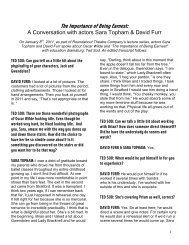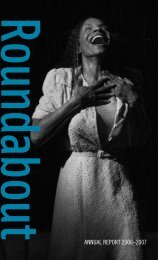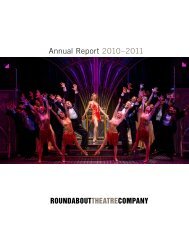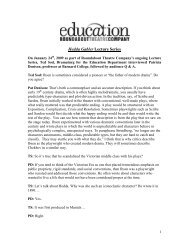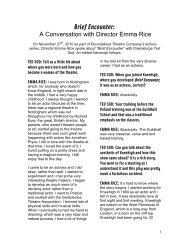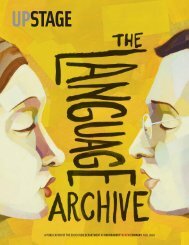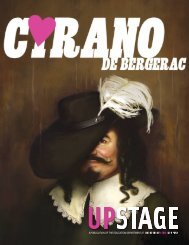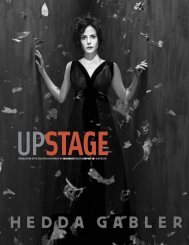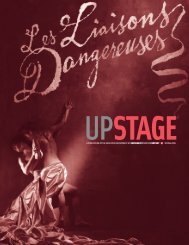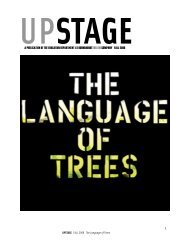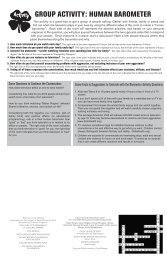Suddenly Last Summer - Roundabout Theatre Company
Suddenly Last Summer - Roundabout Theatre Company
Suddenly Last Summer - Roundabout Theatre Company
Create successful ePaper yourself
Turn your PDF publications into a flip-book with our unique Google optimized e-Paper software.
UPSTAGE<br />
A PUBLICATION OF THE EDUCATION DEPARTMENT AT ROUNDABOUTTHEATRECOMPANY UP FALL 2006
“ I have found it easier to identify with the characters who<br />
verge upon hysteria, who were frightened of life, who<br />
were desperate to reach out to another person. But these<br />
seemingly fragile people are the strong people really.”<br />
–Tennessee Williams<br />
UPSTAGE CONTRIBUTORS: Margaret Salvante-McCann Director of Education; Reneé Flemings Director of Instruction and Curriculum Development; Ted Sod Education Dramaturg;<br />
David A. Miller Education ProgramManager; Jennifer DeBruin Education Associate; Allison Baucom Education Assistant; George Keveson, Christina Neubrand Education Interns;<br />
Kristina Keyes High School Apprentice<br />
COVER: Artwork for the <strong>Roundabout</strong> <strong>Theatre</strong> <strong>Company</strong> production of <strong>Suddenly</strong> <strong>Last</strong> <strong>Summer</strong><br />
ROUNDABOUTTHEATRECOMPANY 231 West 39th Street, Suite 1200, New York, NY 10018 Telephone: 212.719.9393 Fax: 212.869.8817 www.roundabouttheatre.org<br />
Copyright © 2006 <strong>Roundabout</strong> <strong>Theatre</strong> <strong>Company</strong>, Inc. All rights reserved.
UPSTAGE FALL 2006 <strong>Suddenly</strong> <strong>Last</strong> <strong>Summer</strong><br />
4<br />
6<br />
8<br />
10<br />
4 The Director’s Interpretation: Mark Brokaw<br />
6 The Actor’s Interpretation: Blythe Danner<br />
8 The Sound Designer’s Interpretation:<br />
Peter Golub<br />
10 The Lighting Designer’s Interpretation:<br />
David Weiner<br />
12 Interpreting <strong>Suddenly</strong> <strong>Last</strong> <strong>Summer</strong><br />
13 The Audience’s Interpretation<br />
12<br />
13<br />
3
The Director’s<br />
I n t e r p r e t a t i o n<br />
DURING REHEARSALS UPSTAGE CAUGHT UP WITH SUDDENLY LAST SUMMER<br />
DIRECTOR MARK BROKAW<br />
Why did you decide to do this play?<br />
Well, first of all it was written by Tennessee Williams.<br />
He is one of the great American wordsmiths, and the<br />
greatest way that I think the theatre is different from<br />
all other performance mediums is that at its absolute<br />
core it’s about language and what transpires between<br />
living, breathing human beings through the exchange of<br />
language. He was one of the great masters of language.<br />
He was able to harness it in a very specific way unlike<br />
anyone else and unleash it emotionally in a way that few<br />
other writers have been able to match. Also, on a purely<br />
surface level, I think that <strong>Suddenly</strong> <strong>Last</strong> <strong>Summer</strong> is just<br />
a fascinating story. It’s a great gothic suspense yarn,<br />
a really macabre “who dunnit.” I also think it’s a play<br />
that’s been rarely seen in New York. It’s only had one<br />
major revival in this city in the almost fifty years since its<br />
premiere. A lot of folks think they know the play because<br />
of the film and there are great differences between the<br />
two, although the play is done quite often regionally.<br />
<strong>Last</strong>ly, I think I’m just blessed with this terrific cast who<br />
I think bring a great compassion to a group of human<br />
beings that could easily be caricatured.<br />
What do you think is going to be the biggest challenge<br />
about directing this piece?<br />
I think it’s an easy story to take a black and white<br />
approach towards in terms of who is telling the truth and<br />
who is not, and who is right and who is wrong. Of course,<br />
the telling of truth is so central to Tennessee Williams in<br />
any play he wrote, and especially in anything he wrote<br />
about himself personally.<br />
Do you see it as an autobiographical play?<br />
That’s a very loaded question. I think that it’s one of his<br />
most highly personal plays, but it would be reductive to<br />
say that it’s merely autobiographical. I think that even he<br />
admitted in an interview somewhere along the line that<br />
it was a play that probably dealt most directly with his<br />
life and traumas — and I don’t know if pain is the right<br />
word, I can’t remember — but there was something about<br />
it that made it the most directly reflective of his struggle<br />
with the demons in his life. It is the only play he wrote<br />
while undergoing psychoanalysis. He was going five<br />
times a week. I think he really had a desire to exercise<br />
some of his demons and hopefully come out on the other<br />
side, able to have left behind, and I’m going to slightly<br />
paraphrase here, “his need to write about such violent<br />
people in violent situations.” As part of the treatment<br />
his doctor asked him to cease writing during the course<br />
of their daily sessions, which of course he wasn’t able<br />
to do. He wrote every day. I read somewhere else that<br />
a friend of his said that “to understand him you had to<br />
understand that his need to write was biological.” It was<br />
impossible for him not to.<br />
What about the violence in the play? Do you think it<br />
will have the same punch as it did when it was first<br />
produced?<br />
I think it has just as much punch now. There’s that<br />
famous saying by him, that “we all devour each other<br />
in our fashion.” I think it’s that idea of devouring, of<br />
exploitation of others that is so much at the center of<br />
the story. It was something that concerned him greatly.<br />
I remember reading another interview where he said<br />
something along the lines of “animals feed upon each<br />
other for survival, out of hunger, but man doesn’t have<br />
that excuse.” I think that if memory serves me right,<br />
Williams’ word was that he had a “repulsion” for this<br />
characteristic of man, that predatory nature, the way<br />
that we use people without conscience, I think that<br />
is true on so many levels in this story and just in our<br />
world, the way that societies devour other societies,<br />
that family members devour other family members<br />
— any human being exploiting another for their own<br />
selfish good and the hypocrisy that goes part and parcel<br />
with that, the smoke screens that we all hide behind,<br />
and the walls of reasoning that we build to cover that<br />
rampant exploitation. Do we invade other countries to<br />
protect them, or to exploit their natural resources for<br />
our own gain? I think this using of others is really the<br />
cannibalism that’s at the center of the story and at the<br />
center of the debate<br />
How did the creative team come up with the world of<br />
this play? It could go in a lot of different directions,<br />
don’t you think?<br />
I think that it’s a very tricky world to realize. At the<br />
beginning of the play Mrs. Venable says, “this was<br />
Sebastian’s garden.” It is the creation of a very singular<br />
human being, somebody whose personality permeates<br />
every aspect of the story. It’s a reflection of his world<br />
view, one that’s mirrored in that story you already<br />
mentioned about the devouring of the turtles. There is<br />
4 ROUNDABOUTTHEATRECOMPANY
UPSTAGE FALL 2006 <strong>Suddenly</strong> <strong>Last</strong> <strong>Summer</strong><br />
“The greatest way that I<br />
think the theatre is different<br />
from all other performance<br />
mediums is that at its<br />
absolute core it’s about<br />
language and what transpires<br />
between living, breathing<br />
human beings through the<br />
exchange of language.”<br />
Photo: Joan Marcus<br />
a predatory feeling to this place, a sense that it could<br />
reach down and swallow you up just like the Venus<br />
flytrap swallows up the unsuspecting insects. I think<br />
it’s a primeval place filled with, as she says, “plants that<br />
prey upon the world around them.” So we were always<br />
thinking about the garden as the creation of this man<br />
who was a man of great appetites, and appetites that were<br />
not socially acceptable at the time.<br />
Are you getting a clearer picture of Sebastian?<br />
I think you get a clearer picture, and at the same time<br />
there are the ambiguities and the paradoxes. He<br />
certainly is one of the most interesting and completely<br />
drawn offstage characters I’ve ever bumped up against,<br />
but I think that for all we know about him he also still<br />
manages to remain an ambiguous character full of<br />
mystery as well.<br />
You mentioned table work and for our students I<br />
guess that’s a new idea. How much table work are<br />
you doing?<br />
That’s something that’s always different for every<br />
production. We will have spent almost four days around<br />
the table, and hopefully you’re making great discoveries<br />
together that are the basis for the creation of this shared<br />
world that will be the world of the play. And by that I mean<br />
the world of the story in terms of given circumstances.<br />
Who is Sebastian? What is everybody’s relationship to<br />
him and this garden? And to all of the other characters?<br />
And what is their stake on this day in the course of events<br />
that transpire? Why is it so important for each of them to<br />
either suppress, or draw out, this story from Catherine<br />
about the events in Cabeza de Lobo? It’s about making<br />
sure everyone is telling the same story and creating their<br />
piece of the same world.<br />
What advice would you share with a student who is<br />
interested in a career as a director?<br />
I think that the frustrating answer to that question is<br />
that there is no one way, because there are as many ways<br />
to become a director as there are directors out there<br />
working. I think the most important thing is to know what<br />
kind of work you’re drawn to, and to search out where<br />
that work is happening. It doesn’t necessarily mean it’s<br />
New York City; it may be Chicago, it may be Seattle — and<br />
for some, undergraduate and graduate school is the<br />
route. For me it wasn’t initially. As an undergrad I was a<br />
short story writer, and then I went to graduate school for<br />
directing. For others, formal training is not the way at<br />
all. Some move from acting to directing, or from writing<br />
to directing. Basically the right way is the way you do it,<br />
and I think that’s the thing. You just have to do it. You<br />
have to find or create a situation where you get to direct,<br />
whether you get friends together and direct scenes, join<br />
a theatre group where you get an opportunity to direct,<br />
or you create your own group. Or assist other directors<br />
along the way and learn from observing. I do believe that<br />
technique can be taught, but then you ultimately have to<br />
put that technique to the test, and the best way to do that<br />
is to direct. It’s a very proactive field. It won’t come to<br />
you. I think you have to go out and put yourself in enough<br />
situations so that you ultimately make your own luck, and<br />
land or create the job that will give you the opportunity<br />
to test your skills and to grow. UP<br />
Mark Brokaw’s directing credits include The Constant Wife,<br />
Reckless, The Long Christmas Ride Home, Lobby Hero, Old Money,<br />
Tartuffe, The Dying Gaul, As Bees in Honey Drown, How I Learned<br />
to Drive, This is Our Youth, The Good Times are Killing Me, and The<br />
Rimers of Eldritch.<br />
5
The Actor’s<br />
I n t e r p r e t a t i o n<br />
UPSTAGE DISCUSSES SUDDENLY LAST SUMMER WITH ACTOR BLYTHE DANNER<br />
You played Alma in Eccentricities of a Nightingale,<br />
you were nominated for a Tony when you played<br />
Blanche in Streetcar Named Desire, and now you are<br />
playing Mrs. Venable in <strong>Suddenly</strong> <strong>Last</strong> <strong>Summer</strong>. What<br />
is it that attracts you to Tennessee Williams?<br />
I just have a passion for his work, a real devotion. I knew<br />
him slightly when I was at Williamstown <strong>Theatre</strong> Festival.<br />
He asked me to do some of his later plays, but I was in<br />
California raising my children. There’s no American<br />
writer quite like him. He strikes emotional chords that<br />
are so deep and releases tremendous feeling through his<br />
poetry. It’s nearly every actor’s dream to embrace and<br />
explore his work.<br />
How do you see the character of the playwright<br />
revealed through the characters in his plays?<br />
I think both women in this play, Catherine and Mrs.<br />
Venable, are different sides of the man himself. He had<br />
a real affinity for his women. All his women seem fragile<br />
but have strong, if misguided, centers. I suppose many<br />
of them would be considered to be iron butterflies.<br />
I was wondering if you were getting a clear picture of<br />
the character, Sebastian, since you’ve been working<br />
on the play.<br />
Clearly we learn, as the play progresses, that he was<br />
not as Venable paints him to be in the first part of the<br />
play. She idealizes him and is seemingly oblivious to his<br />
reality, and lurking far underneath is her realization of<br />
the truth which she cannot bear – so she has managed to<br />
block it out completely.<br />
You have one line in this play that struck me, when<br />
she says, “Sebastian’s trying to find God.”<br />
I love that. Then when she says, “I mean a clear image of<br />
“I think both women in this<br />
play, Catherine and Mrs.<br />
Venable, are different sides<br />
of the man himself.”<br />
6 ROUNDABOUTTHEATRECOMPANY
UPSTAGE FALL 2006 <strong>Suddenly</strong> <strong>Last</strong> <strong>Summer</strong><br />
him,” because it’s a brutal God that she talks of mostly.<br />
It’s just extraordinary language. I’ve been wrestling with<br />
it and I’m still wrestling with it, but when she says, “I<br />
mean a clear image of him,” does she really mean that<br />
God is only brutal? It’s still enigmatic to me.<br />
What is the challenge for you, or any actress in<br />
playing Mrs. Venable?<br />
Playing a Williams character is like painting on a very<br />
large canvas but with broad and small subtle strokes, so<br />
the challenge is discovering how to play both. None of<br />
his characters are black and white. They are all complex,<br />
and you must explore each clue, leave no stone unturned.<br />
I’ll be on that search until closing night.<br />
What is that process like for you?<br />
I always work very slowly. I’m usually the last one off<br />
the book as far as learning lines. I just have to really<br />
get my footing. I have found working on this play that I<br />
experience almost a loss of reality. Because the language<br />
is so intoxicating, I often feel as if I am in a dream. It may<br />
sound absurd, but when I take my glasses off and can’t<br />
see everyone clearly, the dreamlike quality is illuminated<br />
for me. It’s like being in a fog. It somehow allows me to<br />
enter the world more easily.<br />
What about dialect? Is that something that is just<br />
natural to you or is that something you have to work<br />
at?<br />
I have always loved playing Southern women. New<br />
Orleans is a little more difficult because it’s got a little bit<br />
of the Brooklynese, of the “woik,” instead of “work.” And<br />
this is a Garden District lady, so she’d be a little bit more<br />
upper class with only a smattering of the Brooklynese.<br />
a way to do that on film, in a condensed way, allowing the<br />
physicality to build the emotion deep within.<br />
You went to Bard College. Did you meet any teachers<br />
that influenced you?<br />
Very much so. We were so fortunate to have three very<br />
different kinds of teachers. One who was British and we<br />
explored Shakespeare, but in an unorthodox way – very<br />
freewheeling, strong parameters, but within those<br />
parameters given a lot of leeway. Then we had a teacher<br />
who taught us very much the practical, how to physically<br />
approach things. Then we had a wonderful Method<br />
teacher. So I was getting three different disciplines that<br />
were really helpful.<br />
Would you recommend that type of education to a<br />
young person?<br />
I think Liberal Arts are really important. We had some<br />
brilliant philosophy teachers and literature teachers.<br />
Bard was, still is, a very rich place for the arts. My<br />
children didn’t stay in college because they knew very<br />
much what they wanted to do, but they had such a hunger<br />
for learning, which is fulfilled through their work and<br />
reading and exploring. If you’re blessed with curiosity,<br />
you never stop learning. But if you can, it’s good to start<br />
out with a good, well-rounded education. UP<br />
Blythe Danner’s credits include The <strong>Last</strong> Kiss, Huff, Will & Grace,<br />
Meet the Fockers, Meet the Parents, Forces of Nature, The X Files,<br />
Brighten Beach Memoirs, The Miser at Lincoln Center, Butterflies<br />
are Free, Streetcar Named Desire and Follies.<br />
You’ve been in film and you’ve been on television. Do<br />
you find that it takes a different technique for each<br />
medium?<br />
I used to feel that way and I intensely disliked film. I<br />
always found it difficult, and it’s just in the last couple<br />
of years that I have finally been able to find in film what<br />
I have been able to find on the stage. Stage affords you<br />
such physical freedom, and that’s how I’ve always found<br />
the characters – through the physicality. Now I’m finding<br />
7
The Sound Designer’s<br />
I n t e r p r e t a t i o n<br />
UPSTAGE DISCUSSES SUDDENLY LAST SUMMER WITH SOUND DESIGNER PETER GOLUB<br />
Given the fact that you are doing both composition<br />
and sound, what does that mean?<br />
We are trying to create a world that is the embodiment of<br />
this garden that’s almost like a jungle. It’s this overgrown<br />
beautiful and yet somewhat dangerous garden that they<br />
live in, in New Orleans, that threatens to overwhelm the<br />
characters. These sounds of the garden will play a part in<br />
creating that world, as will the music. In some respects<br />
there may be a fine line between what’s music and what’s<br />
sound because some of the music I’ll be doing will be not<br />
melodic, thematic material, but will be the atmosphere<br />
of this garden. Some of these sounds will be naturalistic,<br />
and some will be more abstract, almost musicalized<br />
versions of the garden. So both will be working together<br />
to create this world.<br />
Do you believe that this garden is a representation of<br />
Sebastian?<br />
Yes, in part because it’s his creation, but also because of<br />
the relationship, the family relationship of the mother<br />
and son. That’s how I see it. Mark may have a different<br />
answer to this question. It’s kind of a role that this whole<br />
story and these people are part of that envelopes them<br />
and embodies their inner life.<br />
How would you describe your process when you’re<br />
doing both the sound and the music?<br />
I watched some rehearsals over the weekend. I read<br />
the script, of course, and have a discussion with the<br />
director, because there are so many different possible<br />
and valid approaches to any work with Williams I think<br />
in particular, because they are such rich plays that they<br />
can withstand varying interpretations. So you need to<br />
know what the director is thinking. Above and beyond<br />
that, it is really important to hear it coming out of the<br />
mouths of the cast. How it is cast and who is playing each<br />
role is going to really determine what it’s going to play<br />
like. Until I heard them and saw them move and just saw<br />
what they looked like and what they sound like it was<br />
kind of a blank page to me, or only a partial page. Now I<br />
have a sense of who these people are in this production<br />
and what they feel. I have a much better sense of where<br />
to go with it.<br />
Once you’ve seen the people and heard them speak,<br />
do you start thinking of them in terms of musical<br />
instruments?<br />
Not really. That’s not usually how it works. For me it’s more<br />
about getting the atmosphere and the color. What are the<br />
instruments that I’m going to want to use that will evoke<br />
this atmosphere? Is it going to be strings? Is it going to be<br />
woodwinds? Or a combination? Or a lot of percussion?<br />
You try to find the color, for lack of a better word, or the<br />
timbre of the sound and from that you start to develop<br />
musical themes or harmonies that propel it. For me it’s<br />
just finding that atmosphere.<br />
Have you decided on any instruments?<br />
No, I haven’t nailed it down. I’m on a direction now and<br />
I’m imagining some strings, some winds, and some<br />
percussion. That’s what I’m imagining right now.<br />
Will the time period play any part in your decision or<br />
your creative process, the fact that it takes place in<br />
1936?<br />
Not in any kind of historical manner. I’m not going<br />
to use the music of that period. It’s not like you’re<br />
doing something set in the eighteenth century French<br />
court or something where you’re trying to do a period.<br />
At the same time I don’t want to do anything wildly<br />
anachronistic because it’s not that kind of production.<br />
It’s not a production that’s set out of the time that it was<br />
written as so many are these days. It does respect the<br />
locale that it’s given so I want to be true to that, but I’m<br />
not trying to do a New Orleans 1935 jazz score like the<br />
movie for Streetcar Named Desire. I’m going more for<br />
the internal life of the characters without a real concern<br />
for historical authenticity, but at the same time not<br />
wanting to do anything that shatters the sense of location<br />
in that time.<br />
Do you start with a theme or a melody? How do you<br />
work?<br />
It’s a little different each time. I’ll sit down and just start<br />
improvising and come up with some material. It might<br />
be a theme, it might be a chord progression, it might<br />
just be a color; I’ll try to shape that into something and<br />
then run it by Mark to see how it gels with his thinking.<br />
It all has to be part of his vision for this production as<br />
all the elements do. I see what the set looks like. I’m<br />
thinking about that all the time the color of the set, the<br />
feel of that set, trying to create something that lives in<br />
that atmosphere. As if when you walk up there it’s been<br />
in that space for a long time.<br />
What might you tell a student who is interested in<br />
this type of career?<br />
I think you have to go to the opera a lot. You have to really<br />
8 ROUNDABOUTTHEATRECOMPANY
“With Williams<br />
the language is<br />
so complete and the<br />
language to me is what<br />
really drives<br />
the thing.”<br />
UPSTAGE FALL 2006 <strong>Suddenly</strong> <strong>Last</strong> <strong>Summer</strong><br />
figure out how Mozart and Verdi and people like that<br />
wrote music for dramatic theme, for specific character,<br />
for specific actions, and how they get this sense of color<br />
and drama in music. In opera the music is what’s really<br />
driving the drama. To me that’s kind of like the motherload.<br />
And also, you have to do it; like anything, talking<br />
about it is one thing, but you have to actually do it. If<br />
this is something you want to do professionally you<br />
have to start doing it in student productions, in amateur<br />
productions, whatever you can find. It’s really trial and<br />
error. Music has this ability to change the audience’s<br />
perception of some things. Any music you put up there is<br />
going to alter the perception of that moment so you have<br />
to know how what you do affects the whole process. The<br />
other thing is films. I think seeing how film music works<br />
can also be a real key of how to write dramatic music.<br />
It seems like film music always heightens whatever<br />
emotion they want us to feel.<br />
It’s much more prevalent and it’s much more full blown<br />
in film for various reasons. Incidental music used to be a<br />
big thing. In the nineteenth century plays had incidental<br />
music and now it’s something that’s done with much<br />
more caution than it used to be. So that’s why film can<br />
be instructive.<br />
Will there be any underscoring in <strong>Suddenly</strong> <strong>Last</strong><br />
<strong>Summer</strong>?<br />
There might be some, we’re just trying to work that out.<br />
Again, it’s trial and error. With Williams the language is<br />
so complete and the language to me is what really drives<br />
the thing. It’s not so much that you’re getting in the way<br />
of exposition, but in some plays, like Shaw, for example<br />
there’s just so much language that’s expository and you<br />
don’t want to get in the way of that.<br />
What is your instrument?<br />
I play piano, that’s my main instrument.<br />
advisable to be aware of the computer technology that’s<br />
available. There’s so much you can do with it, its such a<br />
great tool.<br />
So be computer savvy. I guess most of the kids<br />
coming up are.<br />
Very computer savvy, but also learning the music software<br />
and being able to manipulate sound and actually make<br />
music on the computer.<br />
Once you compose this, then what happens? Do you<br />
go to a studio, or hire musicians?<br />
I am going to create mock ups of my pieces for Mark<br />
to hear. Then when I see how those are falling, what’s<br />
working and what isn’t, I’ll record with real instruments.<br />
I can use a computer for a lot of this stuff and some<br />
people wouldn’t even know it’s a computer, but whatever<br />
we use will be replaced in the recording studio.<br />
Just to wrap this up is there anything I didn’t ask<br />
you about or something obvious I’m forgetting? It<br />
doesn’t necessarily have to be related to <strong>Suddenly</strong><br />
<strong>Last</strong> <strong>Summer</strong>.<br />
Two things: one is that I did a show at the <strong>Roundabout</strong><br />
quite a few years ago, Rosencrantz and Guildenstern are<br />
Dead. The other thing is that I do a lot of film music and<br />
that’s become part of my work in the last few years. UP<br />
Peter has composed and worked on projects for theatre, film,<br />
ballet and concert hall including Macbeth at the Delacrote,<br />
Measure for Pleasure, Othello, Twelfth Night, and Henry IV at the<br />
New York Shakespeare Festival, Hedda Gabler on Broadway,<br />
Glass Menagerie at Berkely Rep, The Joy of Going Somewhere<br />
Definite at the Mark Taper Forum in Los Angeles, Rosencrantz<br />
and Guildenstern are Dead at <strong>Roundabout</strong>, and the films<br />
Wordplay, The Laramie Project, The Lost City and The Addams<br />
Family. He is the director of the Sundance Film Music Program<br />
at the Sundance Institute.<br />
So in addition to going to the opera and studying<br />
film music, should a young person learn an<br />
instrument?<br />
You have to learn an instrument. And these days it’s<br />
9
The Lighting Designer’s<br />
I n t e r p r e t a t i o n<br />
UPSTAGE DISCUSSES SUDDENLY LAST SUMMER WITH LIGHTING DESIGNER DAVID WEINER<br />
Before we talk about <strong>Suddenly</strong> <strong>Last</strong> <strong>Summer</strong>, could<br />
you talk a little bit about your normal process as a<br />
lighting designer?<br />
It varies from project to project and it’s tied to the<br />
relationship with the director, but it starts with the text.<br />
Always. I read the text a number of times. I try to read it<br />
the first time without thinking about design. I just read<br />
it, absorb it and understand from a text perspective,<br />
absorbing the ideas of the play. I don’t like to put<br />
something on it right away. I want to kind of be with it.<br />
What do you do after that process of just living with<br />
the text?<br />
Meeting with the director and set designer are where it<br />
usually goes next, and that’s where it varies from project<br />
to project. Sometimes the director and set designer<br />
have met previously and already have developed an idea.<br />
Other directors invite me into the process very early. It<br />
allows and informs my participation in the process in a<br />
different way because I’m in on the ground floor of the<br />
idea. But either way, that’s usually the next step in the<br />
process.<br />
Isn’t this a play that really needs to have mood evoked<br />
in many ways or am I projecting that on to it?<br />
In this text Tennessee Williams is very specific about the<br />
lighting. He talks about the lighting and the atmosphere<br />
of the environment that these people are inhabiting. If<br />
you really take it on that level, absolutely my work should<br />
affect or shape the way the piece is. The playwright said<br />
so. You could say, “well, we’re not going to do that,” but<br />
I think and I know Mark Brokaw believes to a certain<br />
extent that you have to honor those words. It’s different<br />
when you read a text that has stage directions in it that<br />
were inserted after the fact and those are rarely of<br />
interest. These are design ideas and production ideas<br />
that were profited by Williams so you have to embrace<br />
them to begin with. You may not use them all the way,<br />
full out, but I guess they’re at least some sort of starting<br />
ground. So yes, my work should definitely affect the way<br />
the people feel.<br />
It all takes place it seems in one afternoon, outdoors,<br />
so we probably get a change of “natural light” right?<br />
Yes, we do, except in our production I don’t think we’re<br />
going to treat it that literally. It’s five o’clock on a late<br />
summer afternoon and it’s September, so in the seventy<br />
minutes that the play takes place there really wouldn’t<br />
be much of a change by five or six thirty; it’s still light<br />
out. Williams says in the beginning that it’s very hot<br />
and steamy right after a rain storm in the garden of<br />
central Louisiana. We want it visually to feel like beams<br />
of sunlight cutting through the foliage of the garden and<br />
making sort of the rays of God, if you will. But as the<br />
play evolves, rather than the look progressing towards<br />
the sunset, as it were, it actually progresses towards a<br />
more brittle version of where we started. It becomes<br />
less inviting, less friendly, and more dangerous, more<br />
frightening; not in a ghoulish kind of way, but stark and<br />
crispier. So the world that started out soft and beautiful<br />
becomes more hard-edged and kind of like broken<br />
glass.<br />
How do you develop a relationship with the director?<br />
It varies from director to director. I think the key to<br />
developing a relationship with a director is listening<br />
to them. There’s the part of getting to understand who<br />
they are as an artistic human being and as a person,<br />
the energy they like to have. When it comes down to it,<br />
it’s really important to be a brilliant visual artist, but<br />
it’s equally important to want to spend time in a room<br />
with somebody. So I just try to tune into the energy of<br />
the person. Mark is so lovely and delightful and so smart<br />
that it’s not so hard to do.<br />
Could you talk a little bit about technology? It seems<br />
that lighting technology keeps evolving all the time.<br />
In theatrical lighting today there are lots of toys that<br />
one can have on a show. There are moving lights, color<br />
scrollers, and strobe lights. It’s a long list. And now there<br />
is LED (Light Emitting Diode) technology. Technology<br />
does play a role, although in <strong>Suddenly</strong> <strong>Last</strong> <strong>Summer</strong><br />
we’re not using a great deal of that technology. We’re<br />
using four HMI (Hydrargyrum Medium-Arc Iodide)<br />
lekos. They’re manufactured by a company called Robert<br />
Juliat out of France. They’re extremely bright, but they<br />
are projectors in the sense that you can put a template or<br />
a gobo in them.<br />
What might you suggest to a young person who is<br />
interested in being a lighting designer?<br />
I would start by saying that it’s a different deal for<br />
everybody. Everybody has different needs in terms of<br />
how they learn to do this craft, if they want to do this<br />
craft. My path was a little bit unusual in that I originally<br />
10 ROUNDABOUTTHEATRECOMPANY
UPSTAGE FALL 2006 <strong>Suddenly</strong> <strong>Last</strong> <strong>Summer</strong><br />
“With Williams the<br />
language is so complete<br />
and the language to<br />
me is what really drives<br />
the thing.”<br />
as a young adult came to New York City to be an actor,<br />
I was certain of it. I went to NYU undergrad and was in<br />
the Tisch program, but even before then I was always<br />
interested in the production side of theatre. I had done<br />
a fair amount of it on an amateur level in high school,<br />
both acting and production work. I came to the city and<br />
studied acting at Circle on the Square and after about a<br />
year it was pretty clear that I probably didn’t want to be an<br />
actor. At the same time I started designing shows at NYU.<br />
A lot of students did a lot of little things and I was finding<br />
more and more that design was drawing my interest. It<br />
was at that point that I had to take a class, a design class<br />
for non-designers. It was with a scenic designer named<br />
Doug Stein, who I think is a really brilliant guy. And<br />
Doug completely opened my eyes to this idea that design<br />
for the theatre is about ideas. That never occurred to<br />
me. It had always been you know, you make a set, you<br />
make some lights and you make it look pretty, but he<br />
opened up this idea about design being ideas. Some<br />
people really want a more formal process and there are<br />
some great, great graduate programs. I would certainly<br />
never do it now, but there are times I wonder if I would<br />
be a different designer if I had gone that route. If I had<br />
gone to grad school, what kind of work would I be doing?<br />
How would I be different? I’ll never know and I’m very<br />
happy with the way I went. I got to see a lot of interesting<br />
people, do interesting work in the real world. No grad<br />
school can give you that. UP<br />
11
12 ROUNDABOUTTHEATRECOMPANY<br />
<strong>Suddenly</strong> <strong>Last</strong> <strong>Summer</strong> is set in Sebastian’s garden which is filled with exotic plants,<br />
including the highly metaphorical Venus Fly Trap.
UPSTAGE FALL 2006 <strong>Suddenly</strong> <strong>Last</strong> <strong>Summer</strong><br />
The Audience’s<br />
I n t e r p r e t a t i o n<br />
In his interview, Mark Brokow calls Tennessee Williams “one of the great American wordsmiths.” He is<br />
considered a master of language by many scholars. In his writing, he takes great care to connect his dialogue<br />
to emotions.<br />
BEFORE THE PLAY<br />
◆ Consider the names of the main characters: Mrs. Venable, Catherine and Sebastian. Based upon these<br />
names, what do you imagine to be the qualities of these characters?<br />
◆ Define the word "metaphor". What are some common metaphors that you are familiar with from<br />
previous plays, movies and books?<br />
◆ What do you usually consider poetic language? What makes language poetic?<br />
◆ At the heart of this play is a question of who is telling the truth; How do you define truth?<br />
DURING THE PLAY<br />
◆ Listen for various metaphors. What do you think these metaphors represent? There are several events<br />
that are metaphorical-what do these events represent to Catherine?<br />
◆ Notice when your opinion of who is telling the truth changes and why.<br />
◆ Listen for language that paints a picture. What makes this language sound like poetry?<br />
AFTER THE PLAY<br />
◆ Write a short poem from Sebastian's perspective about truth, including metaphor when you can.<br />
◆ Based upon what you have learned about Sebastian, create a drawing using metaphorical images that<br />
represents his perspective of truth about his life.<br />
13
When you get to the theatre...<br />
BELOW ARE SOME HELPFUL TIPS FOR MAKING YOUR THEATRE-GOING EXPERIENCE MORE ENJOYABLE.<br />
TICKET POLICY<br />
As a student participant in Producing Partners,<br />
Page To Stage or <strong>Theatre</strong> Access, you will receive<br />
a discounted ticket to the show from your teacher<br />
on the day of the performance. You will notice<br />
that the ticket indicates the section, row and<br />
number of your assigned seat. When you show<br />
your ticket to the usher inside the theatre, he<br />
or she will show you where your seat is located.<br />
These tickets are not transferable and you must<br />
sit in the seat assigned to you.<br />
Performance<br />
Date and Time<br />
Show Title<br />
Row<br />
PROGRAMS<br />
All the theatre patrons are provided with a program<br />
that includes information about the people<br />
who put the production together. In the “Who’s<br />
Who” section, for example, you can read about<br />
the actors’ roles in other plays and films, perhaps<br />
some you have already seen.<br />
Section<br />
AUDIENCE ETIQUETTE<br />
As you watch the show please remember that the<br />
biggest difference between live theatre and a<br />
film is that the actors can see you and hear you<br />
and your behavior can affect their performance.<br />
They appreciate your applause and laughter, but<br />
can be easily distracted by people talking or getting<br />
up in the middle of the show. So please save<br />
your comments or need to use the rest room for<br />
intermission. Also, there is no food permitted in<br />
the theatre, no picture taking or recording of any<br />
kind, and if you have a cell phone, beeper, alarm<br />
watch or anything else that might make noise,<br />
please turn it off before the show begins.<br />
Seat<br />
<strong>Theatre</strong> Name<br />
and Location<br />
Price<br />
ROUNDABOUT THEATRE COMPANY’S STUDENT MATINEE SERIES GENEROUSLY UNDERWRITTEN IN PART BY<br />
ROUNDABOUT THEATRE COMPANY GRATEFULLY ACKNOWLEDGES THE FOLLOWING FOR THEIR GENEROUS SUPPORT OF OUR EDUCATION PROGRAM:<br />
The Aeroflex Foundation<br />
American Airlines<br />
American <strong>Theatre</strong> Wing<br />
Axe-Houghton Foundation<br />
Rose M. Badgeley Residuary<br />
Charitable Trust<br />
Theodore H. Barth Foundation<br />
The Center for Arts Education<br />
CIT Group<br />
Citigroup Foundation<br />
Con Edison<br />
The Council of the City of New York<br />
The Samuel and Rae Eckman<br />
Charitable Foundation<br />
The Educational Foundation of America<br />
Ford Motor <strong>Company</strong> Fund<br />
The William Randolph Hearst Foundation<br />
The Heckscher Foundation for Children<br />
HSBC Bank USA, N.A.<br />
JPMorgan Chase<br />
City Council Member Oliver Koppel<br />
The McGraw-Hill Companies<br />
Mellam Family Foundation<br />
Merrill Lynch & Co. Foundation, Inc.<br />
Paul L. Newman<br />
New Visions for Public Schools<br />
New York State Council on the Arts<br />
The New York Times <strong>Company</strong> Foundation<br />
The George A. Ohl, Jr. Trust<br />
One World Fund<br />
The Picower Foundation<br />
Richmond County Savings Foundation<br />
The Rudin Foundation<br />
Adolph and Ruth Schnurmacher Foundation<br />
The Starr Foundation<br />
State of New York Department of State<br />
The Michael Tuch Foundation, Inc.<br />
Edward W. and Stella C. Van Houten<br />
Memorial Fund<br />
Verizon Communications<br />
Walt Disney <strong>Company</strong><br />
U.S. Department of Justice<br />
Anonymous



